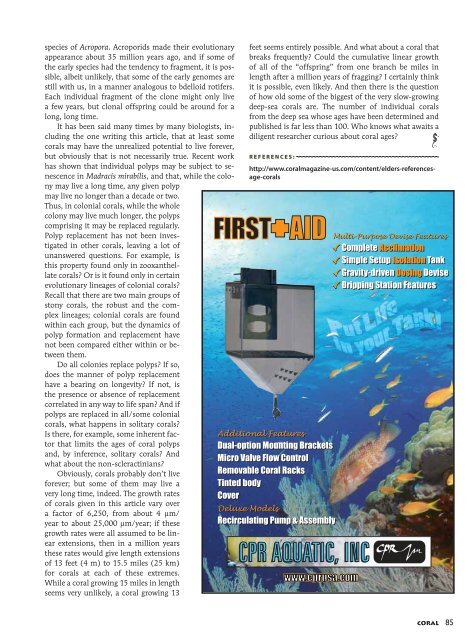You also want an ePaper? Increase the reach of your titles
YUMPU automatically turns print PDFs into web optimized ePapers that Google loves.
species of Acropora. Acroporids made their evolutionary<br />
appearance about 35 million years ago, and if some of<br />
the early species had the tendency to fragment, it is possible,<br />
albeit unlikely, that some of the early genomes are<br />
still with us, in a manner analogous to bdelloid rotifers.<br />
Each individual fragment of the clone might only live<br />
a few years, but clonal offspring could be around for a<br />
long, long time.<br />
It has been said many times by many biologists, including<br />
the one writing this article, that at least some<br />
corals may have the unrealized potential to live forever,<br />
but obviously that is not necessarily true. Recent work<br />
has shown that individual polyps may be subject to senescence<br />
in Madracis mirabilis, and that, while the colony<br />
may live a long time, any given polyp<br />
may live no longer than a decade or two.<br />
Thus, in colonial corals, while the whole<br />
colony may live much longer, the polyps<br />
comprising it may be replaced regularly.<br />
Polyp replacement has not been investigated<br />
in other corals, leaving a lot of<br />
unanswered questions. For example, is<br />
this property found only in zooxanthellate<br />
corals? Or is it found only in certain<br />
evolutionary lineages of colonial corals?<br />
Recall that there are two main groups of<br />
stony corals, the robust and the complex<br />
lineages; colonial corals are found<br />
within each group, but the dynamics of<br />
polyp formation and replacement have<br />
not been compared either within or between<br />
them.<br />
Do all colonies replace polyps? If so,<br />
does the manner of polyp replacement<br />
have a bearing on longevity? If not, is<br />
the presence or absence of replacement<br />
correlated in any way to life span? And if<br />
polyps are replaced in all/some colonial<br />
corals, what happens in solitary corals?<br />
Is there, for example, some inherent factor<br />
that limits the ages of coral polyps<br />
and, by inference, solitary corals? And<br />
what about the non-scleractinians?<br />
Obviously, corals probably don’t live<br />
forever; but some of them may live a<br />
very long time, indeed. The growth rates<br />
of corals given in this article vary over<br />
a factor of 6,250, from about 4 μm/<br />
year to about 25,000 μm/year; if these<br />
growth rates were all assumed to be linear<br />
extensions, then in a million years<br />
these rates would give length extensions<br />
of 13 feet (4 m) to 15.5 miles (25 km)<br />
for corals at each of these extremes.<br />
While a coral growing 15 miles in length<br />
seems very unlikely, a coral growing 13<br />
FIRST<br />
feet seems entirely possible. And what about a coral that<br />
breaks frequently? Could the cumulative linear growth<br />
of all of the “offspring” from one branch be miles in<br />
length after a million years of fragging? I certainly think<br />
it is possible, even likely. And then there is the question<br />
of how old some of the biggest of the very slow-growing<br />
deep-sea corals are. The number of individual corals<br />
from the deep sea whose ages have been determined and<br />
published is far less than 100. Who knows what awaits a<br />
diligent researcher curious about coral ages?<br />
REFERENCES:<br />
http://www.coralmagazine-us.com/content/elders-referencesage-corals<br />
AID<br />
Additional Features<br />
Dual-option Mounting Brackets<br />
Micro Valve Flow Control<br />
Removable Coral Racks<br />
Tinted body<br />
Cover<br />
Deluxe Models<br />
Recirculating Pump & Assembly<br />
CPR AQUATIC, INC<br />
www.cprusa.com<br />
Multi-Purpose Devise Features<br />
Complete Acclimation<br />
Simple Setup Isolation Tank<br />
Gravity-driven Dosing Devise<br />
Dripping Station Features<br />
CORAL<br />
85

















